Business Bank Accounts in Poland
Looking to open a business bank account in Poland? This comprehensive guide covers the best banks for companies, startups, and entrepreneurs operating in Poland. From digital-first solutions to traditional corporate banking, we'll help you find the perfect business banking partner with competitive fees, excellent service, and the right features for your company's needs.
Table of Contents

Santander Bank Polska
Import/export businesses and international companies

Santander Bank Polska
Import/export businesses and international companies
Key Features
Account Details
Summary
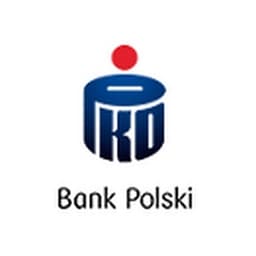
PKO Bank Polski
Large corporations and government contractors
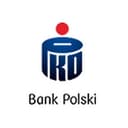
PKO Bank Polski
Large corporations and government contractors
Key Features
Account Details
Summary

mBank
Startups, tech companies, and digital businesses

mBank
Startups, tech companies, and digital businesses
Key Features
Account Details
Summary

ING Bank Śląski
Medium-sized businesses and service companies

ING Bank Śląski
Medium-sized businesses and service companies
Key Features
Account Details
Summary

Millennium Bank
High-net-worth business owners and luxury services

Millennium Bank
High-net-worth business owners and luxury services
Key Features
Account Details
Summary

Alior Bank
Small businesses and innovative companies

Alior Bank
Small businesses and innovative companies
Key Features
Account Details
Summary

Bank Pekao
Large corporations and government contracts

Bank Pekao
Large corporations and government contracts
Key Features
Account Details
Summary
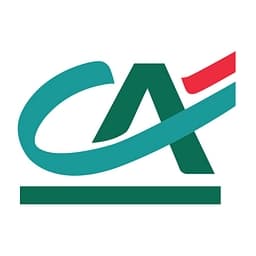
Credit Agricole Bank
Agricultural businesses and rural companies
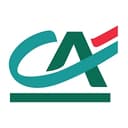
Credit Agricole Bank
Agricultural businesses and rural companies
Key Features
Account Details
Summary
Important Information for Business Banking
Business banking in Poland requires additional documentation compared to personal accounts. Most banks require company registration documents, tax identification numbers, and proof of business address. Many banks offer dedicated business relationship managers who can assist with account opening and ongoing banking needs in English, especially in major business centers like Warsaw, Krakow, and Wrocław.
Why You Can Trust Our Business Banking Guide
We evaluate business banking services based on real business needs and requirements.
Our team includes experienced business owners who understand corporate banking needs.
We regularly update our recommendations based on changing business banking landscape.
All information is verified with current business banking representatives and documentation.
Choosing the Right Business Bank in Poland
Selecting the right business bank in Poland is crucial for your company's financial operations and growth. Business banking needs vary significantly from personal banking, requiring specialized services like corporate accounts, business loans, merchant services, and international trade finance. The Polish business banking market offers diverse solutions from traditional corporate banks to innovative fintech-enabled institutions.
Key factors to consider include monthly fees, transaction limits, international capabilities, digital banking features, and dedicated business support. Many Polish banks now offer English-language business banking services, especially in major cities, making it easier for international companies and foreign entrepreneurs to manage their business finances effectively.

Modern business banking solutions for companies in Poland.
Photo: Warsaw Business District
Essential Business Banking Features
Modern business banking in Poland offers comprehensive solutions including multi-currency accounts, online banking platforms, API integrations for accounting software, and dedicated business relationship managers. Digital-first banks like mBank provide advanced features such as automated invoicing, real-time financial reporting, and seamless integration with popular accounting platforms used by Polish businesses.
Traditional banks like PKO Bank Polski and Santander offer extensive corporate services including trade finance, foreign exchange, and specialized industry solutions. These banks typically provide dedicated business centers with English-speaking staff and comprehensive support for complex financial transactions and international business operations.
Digital vs Traditional Business Banking
Digital business banks offer advantages like 24/7 account access, lower fees, and innovative features such as automated bookkeeping and real-time financial analytics. However, traditional banks provide benefits like in-person relationship management, extensive branch networks, and comprehensive corporate services including investment banking and wealth management.
Many businesses choose a hybrid approach, using digital banks for day-to-day operations while maintaining relationships with traditional banks for specialized services like letters of credit, large-scale financing, and international trade operations.
Cost Structure and Fees
Business banking fees in Poland vary significantly based on account type, transaction volume, and additional services. Monthly maintenance fees typically range from 15-80 PLN ($3.60-$19.20 / €3.30-€17.60), with transaction fees, international transfer costs, and specialized service charges adding to the total cost. Many banks offer fee waivers based on minimum balances or transaction volumes.
Consider the total cost of ownership including hidden fees, currency conversion charges, and premium service costs. Some banks offer transparent pricing with fixed monthly fees, while others use tiered pricing based on business size and needs.
How to Open a Business Account in Poland
Opening a business bank account in Poland requires specific documentation and follows a structured process. The requirements vary depending on whether you're opening an account for a Polish company, foreign company, or sole proprietorship (jednoosobowa działalność gospodarcza). Most banks now offer online pre-applications to speed up the process.
Processing times range from 1-3 days for Polish companies with complete documentation to 5-10 days for foreign companies requiring additional verification. Having all documents properly prepared and translated can significantly reduce delays and avoid multiple bank visits.
Essential Documents Checklist
Polish Companies (sp. z o.o.)
- Fresh KRS extract (not older than 3 months)
- NIP certificate and REGON confirmation
- Articles of association (statut)
- Management board resolution authorizing account opening
- Personal IDs of all authorized signatories
💡 Tip: Get KRS extract right before your appointment
Sole Proprietorship (JDG)
- CEIDG registration confirmation
- NIP and REGON numbers
- Personal ID (passport for foreigners)
- Proof of Polish address (rental agreement or residence card)
- Initial deposit (typically 1,000-2,000 PLN)
⚡ Fastest option: Usually approved within 24 hours
Foreign Companies & Branches
- Apostilled company registration certificate
- Certified Polish translation of all foreign documents
- Polish branch/representative office registration
- Board resolution authorizing Polish operations
- Power of attorney for local representative
- Proof of Polish business address
⏱️ Processing: 5-10 business days due to additional compliance checks
Application Process and Timeline
The account opening process typically takes 1-3 business days for Polish companies with complete documentation, while foreign companies may require 5-10 days due to additional compliance checks. Online pre-applications can speed up the process significantly.
Most banks require an in-person visit for final verification and signature, though some digital banks like mBank allow partial online completion. Bring original documents plus copies, and be prepared to explain your business model and expected transaction volumes during the appointment.
Essential Preparation Tips
Proper preparation can save weeks of delays and multiple bank visits. For foreign documents, use only sworn translators (tłumacz przysięgły) as banks won't accept regular translations. Translation costs typically range from 80-150 PLN per page.
Schedule appointments with the business banking department rather than regular branches, and request English-speaking advisors in advance if needed. The best appointment times are Tuesday through Thursday, 10 AM to 3 PM, when staff are less rushed and can provide better service.
Business Banking Guide for Foreign Entrepreneurs
Opening a business bank account in Poland as a foreigner involves specific challenges and requirements that differ from domestic companies. Foreign entrepreneurs face unique obstacles including language barriers, complex documentation requirements, and varying processes for EU versus non-EU citizens.
This guide addresses the most common issues foreign entrepreneurs encounter and provides practical solutions to navigate the Polish banking system successfully. Understanding these requirements upfront can save weeks of delays and prevent costly mistakes during the account opening process.
EU vs Non-EU Citizen Requirements
The account opening process varies significantly depending on your citizenship status. EU citizens benefit from simplified procedures due to European banking regulations, while non-EU citizens face additional documentation and verification requirements that can extend processing times considerably.
EU Citizens
- Standard KRS registration process
- EU ID card accepted for identification
- No additional work permits needed
- Faster account opening (1-3 business days)
Non-EU Citizens
- Valid residence permit required
- Apostilled documents from home country
- Certified Polish translations required
- Extended processing time (5-10 business days)
English Language Support Comparison
Language support varies significantly between Polish banks, with some offering comprehensive English services while others provide limited support. International banks and digital-first institutions typically offer better English support, making them more suitable for foreign entrepreneurs who prefer conducting business in English.
Santander Bank Polska
Dedicated English-speaking business advisors, comprehensive English documentation, international banking expertise, and specialized support for foreign companies.
mBank
English mobile app interface, online customer support in English, digital-first approach ideal for tech-savvy foreign entrepreneurs, API documentation in English.
PKO Bank Polski
English support available in major cities (Warsaw, Krakow, Wrocław), largest branch network in Poland, government contract specialists with international experience.
Required Documents and Processing Times
Document requirements vary by bank and business type. All foreign documents must be translated by a sworn translator (tłumacz przysięgły) and some require apostille certification. Processing times depend on document completeness and your citizenship status.
Sole Proprietorship (JDG)
- Passport or EU ID
- REGON certificate
- NIP tax number
- Proof of address in Poland
Processing: 1-2 days
Limited Liability (sp. z o.o.)
- KRS court registration
- Articles of association
- Shareholders' resolution
- Management board resolution
Processing: 3-5 days
Foreign Company Branch
- Parent company registration
- Apostilled documents
- Board resolution for branch
- Representative authorization
Processing: 5-10 days
Corporate Banking Services
Corporate banking services in Poland cater to large enterprises and multinational companies, offering specialized financial solutions including trade finance, investment banking, and comprehensive treasury management services.
Trade Finance
- Letters of Credit
- Documentary Collections
- Export/Import Financing
- Currency Hedging
Treasury Services
- Cash Management
- Liquidity Management
- Multi-currency Accounts
- Payment Processing
Investment Banking
- M&A Advisory
- Capital Raising
- Debt Financing
- Risk Management
Business Loans and Financing for Foreign Companies
Getting business financing in Poland as a foreign company is challenging but possible. Polish banks are conservative with foreign businesses and require stronger documentation, guarantees, and typically charge higher interest rates than for established Polish companies.
Understanding the Polish lending environment, documentation requirements, and realistic expectations is crucial for foreign entrepreneurs seeking business financing. Most banks require 12-24 months of local operating history before considering significant loans.

What to Expect as a Foreign Business
Polish banks treat foreign-owned businesses differently than local companies. They view foreign companies as higher risk due to unfamiliarity with foreign business practices, potential language barriers, and concerns about enforcement of agreements across borders.
Foreign companies face significantly stricter lending criteria including higher collateral requirements, often 150-200% of loan value compared to 80-120% for Polish companies. Banks also require mandatory personal guarantees from all foreign shareholders, regardless of company structure or limited liability protection. All foreign documentation must be translated to Polish by sworn translators, adding weeks to the process and thousands of PLN in costs.
Processing times are typically 2-3 times longer than for domestic applications. Banks need additional time for document verification, foreign entity background checks, and internal approvals for international lending. What might take 2 weeks for a Polish company can easily extend to 6-8 weeks for foreign businesses.
Interest rates for foreign companies are typically 1-3 percentage points higher than for comparable Polish companies. Banks factor in perceived higher risk, additional administrative costs, and potential collection difficulties when setting rates. A Polish company might get 4% while a foreign company pays 6-7% for the same loan type.
Credit history from your home country is rarely considered by Polish banks. You essentially start from zero credit profile, regardless of your business success elsewhere. This means even established companies with strong international track records must build local banking relationships from scratch before accessing significant financing.
Documentation and Legal Requirements
The biggest challenge for foreign companies is meeting Polish documentation requirements. All foreign documents must be translated by sworn translators, and many require apostille certification from your home country, which can take weeks and cost thousands of PLN.
Every foreign document must be translated by a Polish sworn translator (tłumacz przysięgły). Translation costs range from 100-300 PLN per page, and complex financial documents like audited statements or business plans can run into thousands of PLN. A typical loan application requiring 20-30 pages of foreign documents might cost 3,000-8,000 PLN just in translation fees. Factor this significant expense into your financing budget and timeline.
Documents from your home country often need apostille certification before translation. This authentication process varies by country but typically takes 2-4 weeks and requires dealing with government offices or embassies. Banks won't accept documents without proper apostille certification, so plan ahead and start this process early. Some countries have faster online apostille services, while others require in-person visits to specific government offices.
Personal Guarantees and Cross-Border Enforcement
Polish banks almost always require personal guarantees from foreign business owners, regardless of company structure. This is a serious legal commitment that can affect your personal assets across the EU and other countries with mutual enforcement agreements.
Personal guarantees are enforceable across EU countries and many other jurisdictions through mutual legal assistance treaties. If you own property in Germany, France, or other EU countries, Polish banks can pursue these assets for debt recovery through European enforcement procedures. Non-EU assets may also be at risk depending on bilateral agreements between Poland and your country. This means your house in London, apartment in New York, or business in Dubai could potentially be seized to satisfy Polish business debt. Consider this carefully before signing guarantee documents and consult with international legal counsel who understands cross-border enforcement mechanisms.
Building Your Financial Profile in Poland
Success in obtaining business financing depends heavily on building strong banking relationships over time. Start this process immediately after company registration, even if you don't need financing yet. Polish banking culture values long-term relationships and consistent business behavior.
In your first 12 months, open business accounts with 2-3 major banks and use them actively. Maintain healthy balances, use all available services including credit cards, transfers, and payroll processing. Process all business income through these accounts to demonstrate legitimate business activity. Meet regularly with business banking managers, communicate your growth plans, and establish personal relationships with key bank personnel.
After 12-18 months of consistent banking activity, start building your credit profile by applying for small overdraft facilities or business credit cards. Submit audited financial statements annually, maintain transparent communication about business performance, and gradually increase your financing requests. Banks track this progression and use it to assess creditworthiness for larger loans.
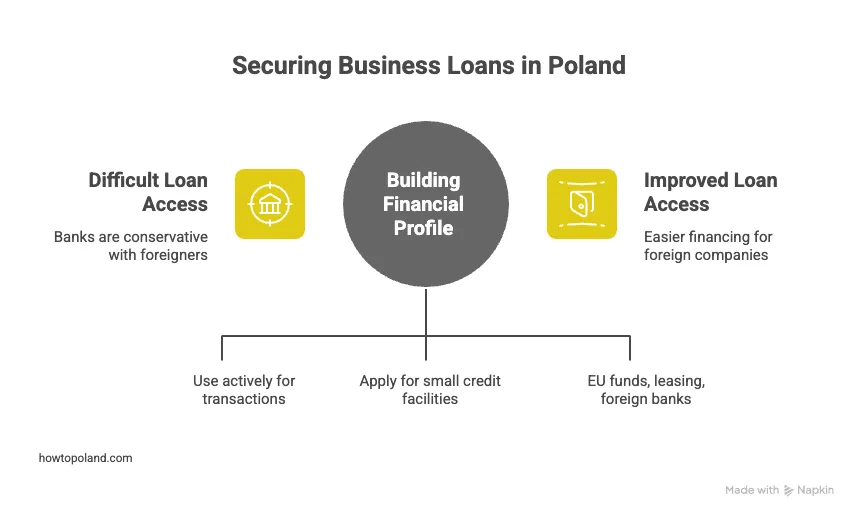
Alternative Financing Options
Traditional bank loans aren't the only option for foreign companies in Poland. Alternative financing methods may be more accessible, especially in the early stages of operations when you haven't yet built strong banking relationships or local credit history.
European Union structural funds offer grants and subsidized loans for business development, innovation, and job creation. These programs often have lower barriers for foreign companies and can provide significant funding without traditional collateral requirements. The application process is complex and time-consuming, but the funding terms are typically much more favorable than commercial loans.
Equipment leasing companies are often more flexible than banks when dealing with foreign businesses. Leasing agreements for vehicles, machinery, and technology typically require less documentation and can be approved faster than traditional loans. The equipment itself serves as collateral, reducing the need for additional guarantees or extensive credit checks.
Consider financing from your home country bank's Polish operations or international development banks. These institutions understand foreign business structures and may offer more favorable terms than local Polish banks. They're familiar with international documentation and may accept credit history from your home country, giving you a significant advantage in the approval process.
Business Banking Terms
Understanding key business banking terminology is essential for making informed decisions about your company's financial services. Here are the most important terms you should know when dealing with business banking in Poland.
| Term | Full Name / Description | Purpose |
|---|---|---|
| NIP | Numer Identyfikacji Podatkowej | Tax identification number required for all business accounts |
| REGON | Statistical number | Assigned by the Central Statistical Office for business identification |
| KRS | Krajowy Rejestr Sądowy | National Court Register for companies and partnerships |
| SEPA | Single Euro Payments Area | Enables free transfers within EU countries |
| SWIFT | Society for Worldwide Interbank Financial Telecommunication | International payment network for cross-border transfers |
| BLIK | Polish mobile payment system | Widely used in Poland for mobile payments.Learn more about BLIK |
| API | Application Programming Interface | Software integration interface for banking services |
Frequently Asked Questions About Business Banking in Poland
What documents do I need to open a business bank account in Poland?▼
To open a business bank account in Poland, you typically need: company registration documents (KRS extract), tax identification number (NIP), statistical number (REGON), business license (if applicable), articles of incorporation, proof of business address, and personal identification of authorized signatories. Foreign companies may need additional documents like apostilled certificates and translated documents.
How long does it take to open a business bank account in Poland?▼
The process typically takes 1-3 business days for domestic companies with complete documentation. For foreign companies or complex corporate structures, it can take 5-10 business days. Digital banks like mBank often process applications faster, sometimes within 24 hours, while traditional banks may require in-person visits and longer processing times.
What are the typical monthly fees for business bank accounts in Poland?▼
Monthly fees range from 15-80 PLN ($3.60-$19.20 / €3.30-€17.60) depending on the bank and account type. Basic business accounts start around 15-25 PLN ($3.60-$6 / €3.30-€5.50), while premium accounts with additional services can cost 50-80 PLN ($12-$19.20 / €11-€17.60) monthly. Many banks offer fee waivers based on minimum balance requirements or transaction volumes. Additional charges apply for transactions, international transfers, and specialized services.
Can foreign companies open business bank accounts in Poland?▼
Yes, foreign companies can open business bank accounts in Poland. EU companies generally have an easier process, while non-EU companies may face additional requirements. You'll need to register your company with Polish authorities (KRS registration) or establish a Polish branch/subsidiary. Some banks specialize in international business and offer dedicated support for foreign companies.
Which banks offer the best English support for businesses?▼
PKO Bank Polski, mBank, Santander, ING, and Millennium Bank offer comprehensive English support for business customers. These banks have English-speaking relationship managers, translated documentation, and English-language online banking platforms. mBank and ING are particularly strong in digital English support, while Santander and Millennium excel in personal relationship management.
What business financing options are available from Polish banks?▼
Polish banks offer various business financing options including working capital loans, equipment financing, real estate loans, trade finance, factoring, and leasing. EU funds and government-backed programs are also available for eligible businesses. Interest rates and terms vary significantly between banks, with digital banks often offering competitive rates for smaller loans.
Do Polish business banks offer multi-currency accounts?▼
Yes, most major Polish banks offer multi-currency business accounts supporting EUR, USD, GBP, and other major currencies. This is particularly useful for import/export businesses and companies with international operations. Santander and PKO Bank Polski have especially strong multi-currency offerings, while some banks provide competitive foreign exchange rates and international transfer fees.
What digital banking features are available for businesses?▼
Modern Polish business banks offer comprehensive digital features including mobile banking apps, online account management, automated payments, API integrations with accounting software, real-time reporting, bulk payments, and digital document management. mBank leads in digital innovation, while other banks are rapidly expanding their digital capabilities to compete.
Are there minimum balance requirements for business accounts?▼
Minimum balance requirements vary by bank and account type. Basic business accounts often have no minimum balance, while premium accounts may require 5,000-25,000 PLN ($1,200-$6,000 / €1,100-€5,500). Some banks waive fees if you maintain certain balances or transaction volumes. It's important to compare not just the minimum balance but also the fee structure and benefits offered.
How do I choose between digital and traditional business banking?▼
Choose digital banking (mBank, ING) if you prioritize low fees, 24/7 access, modern features, and can handle most banking online. Choose traditional banking (PKO, Santander, Millennium) if you need in-person relationship management, complex corporate services, extensive branch networks, or specialized industry expertise. Many businesses use a hybrid approach, combining both for optimal coverage.